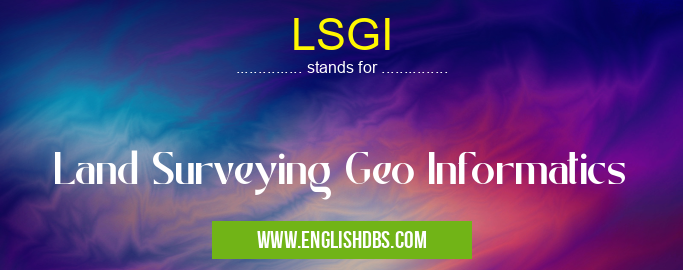What does LSGI mean in UNCLASSIFIED
LSGI stands for Land Surveying Geo Informatics. It is an interdisciplinary field that combines traditional land surveying techniques with geospatial technologies to provide accurate and detailed data about the Earth's surface. LSGI professionals use a variety of tools and technologies, including GPS, GIS, and remote sensing, to collect, analyze, and interpret spatial data.

LSGI meaning in Unclassified in Miscellaneous
LSGI mostly used in an acronym Unclassified in Category Miscellaneous that means Land Surveying Geo Informatics
Shorthand: LSGI,
Full Form: Land Surveying Geo Informatics
For more information of "Land Surveying Geo Informatics", see the section below.
What does LSGI mean?
LSGI is concerned with the collection, storage, analysis, and visualization of spatial data. This data can be used for a variety of purposes, including:
- Land use planning
- Environmental management
- Infrastructure development
- Disaster response
- Precision agriculture
LSGI professionals work with a variety of stakeholders, including government agencies, private companies, and non-profit organizations. They use their expertise to provide valuable insights and solutions to complex spatial problems.
Benefits of LSGI
LSGI offers a number of benefits over traditional land surveying methods. These benefits include:
- Increased accuracy
- Reduced time and cost
- Improved decision-making
- Enhanced collaboration
LSGI is a rapidly growing field that is expected to continue to grow in the years to come. As the demand for spatial data increases, LSGI professionals will be in high demand.
Essential Questions and Answers on Land Surveying Geo Informatics in "MISCELLANEOUS»UNFILED"
What is Land Surveying Geo Informatics (LSGI)?
LSGI combines traditional land surveying techniques with geospatial technologies, such as GIS, remote sensing, and GNSS, to collect, analyze, and manage spatial data. This enables the creation of accurate and detailed digital representations of the Earth's surface and its features.
What are the applications of LSGI?
LSGI has a wide range of applications, including:
- Land use planning and management
- Environmental monitoring and assessment
- Infrastructure design and construction
- Natural disaster mitigation and response
- Cadastral mapping and land registration
What are the benefits of using LSGI?
LSGI offers several benefits over traditional land surveying methods, including:
- Increased accuracy and precision
- Improved efficiency and productivity
- Enhanced visualization and data analysis capabilities
- Reduced environmental impact
What are the key technologies used in LSGI?
The key technologies used in LSGI include:
- Geographic Information Systems (GIS)
- Remote sensing
- Global Navigation Satellite Systems (GNSS)
- Photogrammetry
- LiDAR
What is the future of LSGI?
LSGI is a rapidly evolving field with ongoing advancements in technology and applications. Future trends include:
- Increased integration with other disciplines, such as engineering and environmental science
- Development of new and innovative data collection and processing techniques
- Enhanced use of artificial intelligence and machine learning for data analysis and decision-making
Final Words: LSGI is an important field that provides valuable insights and solutions to complex spatial problems. LSGI professionals use a variety of tools and technologies to collect, analyze, and interpret spatial data. This data can be used for a variety of purposes, including land use planning, environmental management, infrastructure development, disaster response, and precision agriculture. LSGI is a rapidly growing field that is expected to continue to grow in the years to come.
